In the first instalment with Can Creativity Save The World? director Hermann Vaske, we were joined by music producer and 99 Records founder Ed Bahlman. In the second instalment we touched upon Ernst Ulrich von Weizsäcker with a new crop of climate activists, including Luisa Neubauer and Lakshmi Thevasagayam, the power of hope, a couple of Albert Einstein quotes, Garry Kasparov, AI challenges, interesting doublings with Günter Grass and Salman Rushdie, John Cleese, Nick Cave, Slavoj Žižek, Quentin Tarantino, Hans Zimmer, meeting the great Oscar Niemeyer at the Copacabana, Le Corbusier, and what’s coming up in the creativity universe.
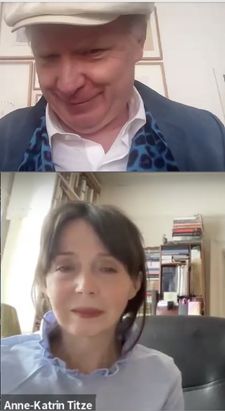 |
| Hermann Vaske with Anne-Katrin Titze on Oscar Niemeyer: “He talked about Le Corbusier and you feel the breath of history.” |
From Berlin, Hermann Vaske joined me on Zoom for an in-depth conversation on Can Creativity Save The World?
Anne-Katrin Titze: I noticed something in your interview with Isabella Rossellini. I think she is wearing Dries van Noten. When I talked with her at a lunch at La Grenouille for David O Russell’s Joy, she was wearing the same thing. I was wondering - either she is wearing her outfits the same way several times, which would be great, or you were by chance at the same luncheon?
Hermann Vaske: No, that was a set-up interview when she presented Casablanca at MoMA. It had to do with an Ingrid Bergman anniversary and we met right before that.
AKT: It might have been the same day and she went from one to the other?
HV: Yeah, could be, sure.
AKT: The clothes looked so great, that’s why I noticed it.
HV: It fits her well.
AKT: I loved the part in your film with Ernst Ulrich von Weizsäcker when he talks about the successful startups always being the ones that accelerate consumption. It’s a very concise, strong moment.
HV: And very emotional. You really feel the urgency of it, almost an alarm call, a wakeup call that he wants to get across. I met him first in Lausanne at a climate conference at the university. He is terrific, a terrific guy.
AKT: Leading into all the younger climate activists and the hopefulness that he has for this new generation!
HV: Totally. What I describe as, quoting Ernst Bloch, principle of hope at the end of the film. It’s a bit of a discussion, but I truly think that without the power of hope … that is the only thing in times of crisis to get us to something like a creative renaissance.
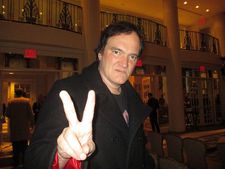 |
| Hermann Vaske on Quentin Tarantino and Hans Zimmer on creativity: “They both said: “Gift from God..." |
AKT: I want to also talk about AI. You end with the Einstein quote “Learn from yesterday, live for today, hope for tomorrow.” That made me think of another quote attributed to him: “If you want your children to be intelligent, read them fairy tales. If you want them to be more intelligent, read them more fairy tales.”
HV: Wow!
AKT: He is absolutely right, because tales do teach children about the world and to think outside the box. But if children are fed AI created stories, then it isn’t fairy tales anymore which depend on the human touch and the result is not the same kind of creativity.
HV: I think that jury is still out. What’s certainly missing is the emotional closeness of that narrative form when you read a story and you’re in the same room. That is irreplaceable for sure. On the other hand we see what AI in terms of creativity can do. I just shot in Los Angeles right now with some artists. There is also a one-plus-one-equals-three partnership in it. But we should not, cannot ignore the dangers of AI.
AKT: Another quote in your film that stood out to me is Garry Kasparov saying: “Dictators don’t play chess.”
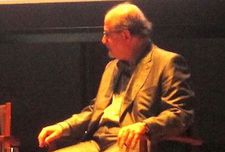 |
| Hermann Vaske on doublings: “Salman Rushdie and Günter Grass without consulting each other, you know, they gave the same answer.” Photo: Anne Katrin Titze |
HV: Yeah and he was saying, of you look for a game dictators play, it’s poker. It’s a great quote, it’s true. I think Kasparov is very outspoken, he speaks tacheles. He’s also a legend, I met him in Cannes, you know. We have a common friend, Joe Pytka. He is the guy who did the Space Jam movie way back in the Nineties.
AKT: In all the many interviews you did, were there some interesting twins' - that is, people who gave the same or a very similar answer? I’m making it up, say Quentin Tarantino and Slavoj Žižek? Couplings where we might say 'Wow, these people have the same answer'?
HV: Yes, Salman Rushdie and Günter Grass without consulting each other, you know, they gave the same answer. Günter Grass in German wrote: “Weil ich muss.” And Salman Rushdie says: “Because I have no choice in the matter.”
And Nick Cave said “I have to be.” Referring to the written answers I have from all the artists. Filming them I was also confronting them with a blank piece of paper. These answers were indeed similar. Nick Cave - because he’s basically a writer too. Compulsion or destiny, I have no choice on the matter - that might be one of the common denominators amongst writers, you know?
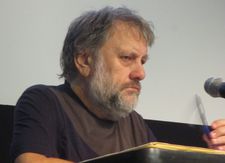 |
| Slavoj Žižek is in Hermann Vaske’s Why Are We Creative: The Centipede's Dilemma Photo: Anne Katrin Titze |
AKT: Yes, it’s interesting that these are all writers who answered this way. Were there other doublings?
HV: Quentin Tarantino and the composer Hans Zimmer, they both said: “Gift from God,” you know, given to us from God. Zimmer said the idea isn’t really mine but given to me.
AKT: There are many older clips of your interviews sprinkled throughout, for instance Oscar Niemeyer in Rio in 2005! How did that come about?
HV: I did a couple of speeches at the Cannes Festival of Creativity over the years and got contacts to Brazil and was invited to São Paulo and Rio to conferences a couple of times. On one of the trips when I was preparing a kind of comedy with John Cleese about football, about soccer, we were shooting there and I thought it would be great to talk with Oscar about it since he built the Maracanã Stadium for Rio de Janeiro.
I was with this friend of mine, Armando Strozenberg, who had connections to the family of Oscar Niemeyer and that’s how it happened. You feel quite blessed. I’ve been to his place at the Copacabana and did see his office where he took me and shared his knowledge. He was great and very very smart. He was around 100 at that time, you know, and still sharp and witty, a great creative man.
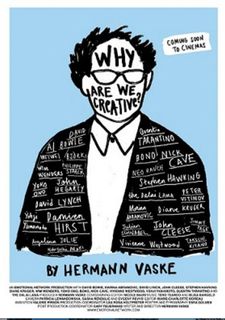 |
| Why Are We Creative: The Centipede's Dilemma poster |
AKT: Great get! From interviewing people I know how sometimes people surprise you by their presence. You know their work before, but being in the same room can feel quite strong. Encountering Oscar Niemeyer sounds like that.
HV: Yes, and he talked about Le Corbusier and you feel the breath of history.
AKT: What’s coming up for you?
HV: The new movie I am doing, Creativo Paradiso, creative paradise, there’s also Alejandro Jodorowsky, whom I shot with in Paris and he might do an exhibition in L.A. the next months. If it happens, I’ll go there and on the way back I could always go through New York. Let’s have dinner somewhere.
AKT: Yes that would be great. Your new project’s title relates to Cinema Paradiso?
HV: It’s Dante’s Divine Comedy meeting Jodorowsky’s The Holy Mountain. It will be quite something.
AKT: You asked a question about The Four Horsemen of the Apocalypse to one of the climate activists in Lützerath. I was thinking if this might be the next series, asking everybody, who are your four horsemen?
HV: It’s the opposite. It’s not descending into the inferno, it’s ascending to the enlightenment. Creative enlightenment, the renaissance.
Read what Hermann Vaske had to say on Cate Blanchett, Shirin Neshat and more with Ed Bahlman.






















